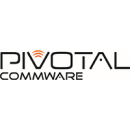Building a business requires taking a huge leap of faith. Building a business in an industry where previous footprints from those who came before are barely visible, if they exist at all, means voluntarily free falling.
These three Seattle companies have done their best to minimize outside risk by defining their missions clearly, over-communicating and systematically investigating consumer demand. We spoke to a few of their leaders about why they put those practices in place and how they best differentiate their products from others emerging in their markets.

Holographic Beam Forming isn’t a long-lost part of The Jetsons family’s teleportation machine. It’s a technique used by Pivotal Commware that employs the lowest C-SWaP (cost, size, weight and power) architecture available to develop software-driven antennas and radios. We learned more about how it came to be from Kent Lundgren, VP of marketing and sales, below.
What strategies has your company implemented to stand out from other companies in your industry?
Pivotal has capitalized on its breakthrough invention in electromagnetic physics, Holographic Beam Forming (HBF), to position the company as an essential element in the 5G ecosystem. Our current flagship product, Echo 5G, offers mobile operators the lowest cost, size, weight and power-consuming 5G beamforming technology available.
It’s a big claim, to be sure. So our overarching strategy has been to not only communicate this unique selling proposition to the 5G ecosystem but also to demonstrate that it’s really true.
...It’s important to know who your customer is and what they really want.’’
What advice would you offer to startup founders or startup-founders-to-be to help them differentiate their companies/products?
While invention breakthroughs are hard to come by, it’s important to know who your customer is and what they really want. The latter is more difficult, but if you can deliver a compelling enough value proposition to win their trust, an ongoing dialog with your customer will reveal the answer. Along the way, deliver on your promises and develop a reputation for truth-telling.

While brownie batter might taste delicious on its own, everyone knows the ingredients are meant for one thing: post-oven greatness. Diego Oppenheimer, CEO and co-founder of Algorithmia, feels similarly about artificial intelligence. It’s certainly groundbreaking (and just plain cool). But more importantly, it’s a tool that can and should drive results. And that’s just what Algorithmia does: They use AI to automate DevOps for machine learning, allowing for rapid iteration.
What strategies has your company implemented to stand out from other companies in your industry?
Machine learning is the largest technological shift of our lifetime. In a very short time, every application will include some sort of ML-driven intelligence. Algorithmia is enabling organizations to make the most of this technology by adopting and deploying ML models at scale. We aim to make ML an everyday reality.
Machine learning is the largest technological shift of our lifetime.’’
What advice would you offer to startup founders or startup-founders-to-be to help them differentiate their companies/products?
I see a lot of startups trying to tackle too many broad problems at once. As a result, they do several things not very well. My advice is to focus on one problem and solve it well.
In the artificial intelligence/ML space, that kind of blanket thinking can translate to the misconception that AI is the goal, when it is actually a tool to reach a goal. It has several challenging components to solve. Throwing ML models at a complex business problem and expecting immediate returned value is problematic. And in fact, it’s only one step in the ML lifecycle. You need to scale and manage those models and connect them to your applications to achieve value.

Jared Cheshier, CTO of Pluto, has learned that using existing resources to develop your product shouldn’t sound like a bad thing. In fact, doing so has allowed the spatial computing communication service to join an extended or mixed reality (XR) ecosystem, opening opportunities that otherwise wouldn’t have existed. Cheshier told us how Pluto stands out so successfully in a new space.
What strategy has your company implemented to stand out from other companies in your industry?
We’ve set ourselves apart by participating in open standards. Virtual reality and artificial reality are still in the wild west days and most try to do everything on their own. When there is a new unsolved challenge, it can be easy to come up with custom solutions for a quick win.
Joining and contributing to working groups developing standards such as OpenXR in Khronos or WebXR in W3C takes coordination, collaboration and patience. It has given us the opportunity to play a part in how the whole industry is evolving and build connections with the major companies, which small startups often struggle to do.
The most valuable piece of advice I can offer is to start by defining a purpose.’’
What advice would you offer to startup founders or startup-founders-to-be to help them differentiate their companies/products?
The most valuable piece of advice I can offer is to start by defining a purpose. Invest the time to validate your company’s purpose. Test it with folks in the real world who have more than one degree of separation from you.
A company built on a solid foundation makes it much easier to make decisions. It can be your most valuable tool for motivation, inspiration and communication as you embark on a journey to create and collaborate with others.










.png)